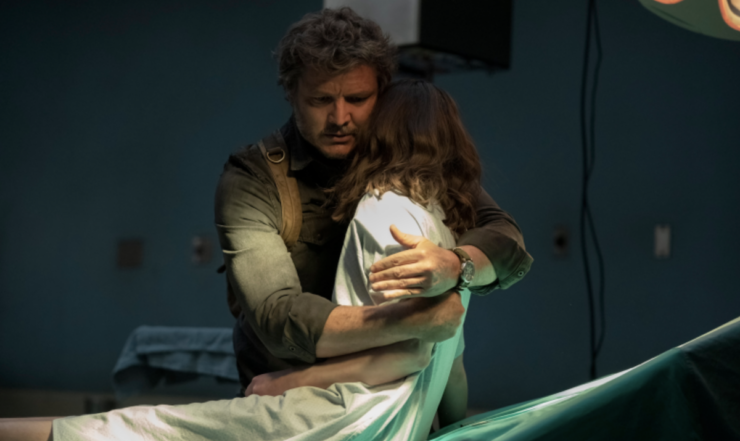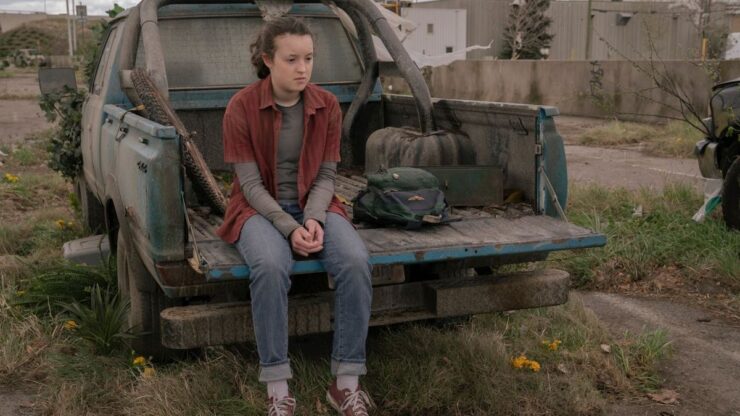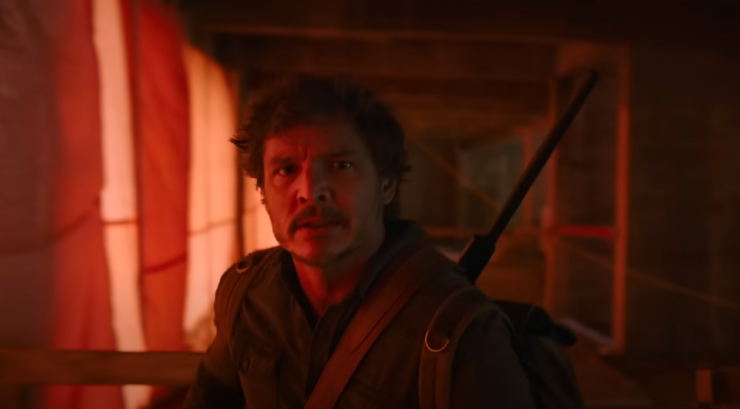He let her down again.
There’s trouble ahead for Joel and Ellie as HBO’s mega-hit The Last of Us ends its first season, but it doesn’t come from the infected. Just like its namesake video game, the story’s true final act is an emotional knife-twist. The implications of Joel’s decisions will cast a shadow over the rest of the show, making the end of the world feel way less important than the possible end of a found father-daughter relationship.
Showrunners Craig Mazin and Neil Druckmann promised a different kind of apocalypse story, one that was about “the beauty and the horror that come from love” and the season finale would’ve been its most tear-inducing episode yet if viewers hadn’t already ugly-cried during at least three different episodes already. And if the episode had ended with rescues and reunions, maybe it would’ve felt triumphant.
But this isn’t The Mandolorian and Joel’s body count in The Last of Us comes with sobering consequences and subtle shifts in allegiances.
[Major spoilers for the entire first season of HBO’s The Last of Us and Naughty Dog’s 2013 video game of the same name and its Left Behind DLC. No spoilers for season two or the game’s sequel.]
Child death has been a recurring theme since The Last of Us began, with Joel’s beloved teen daughter Sarah getting killed on Outbreak Day twenty years before he met Ellie (Bella Ramsey.) Kansas City’s Henry wouldn’t have become the quarantine zone’s most wanted man if he didn’t save his kid brother Sam’s life.
“Kids die all the time,” said Kathleen, the baddie played by Melanie Lynskey in episode five, casually cruel and ironically honest. Lots of kids die in the post-Cordyceps world; like the little boy who wandered into the Boston Q.Z. way back in the first episode, Henry’s innocent kid brother Sam, Ellie’s first love Riley, even the nameless Clicker girl who eventually kills Kathleen. And of course Joel’s own daughter Sarah was killed twenty years before The Last of Us’ present day, changing the trajectory of not just Joel and Ellie’s future days, but the fate of all humankind.

Maybe Kathleen was right and some children are fated to die, but certainly not Joel’s child. Not again.
As much as Joel and Ellie have become TV’s favorite pair, a Lone Wolf and Foul-mouthed Cub, Joel’s decision to take Ellie out of the Fireflies’ hospital and take out literally every Firefly in his way has doomed humanity’s last known hope for a cure to the fungal apocalypse. The showrunners have explicitly confirmed that if the Fireflies killed Ellie, the vaccine created from her brain would have cured the Cordyceps pandemic. TV-Joel knows even less about the previous vaccine trials and errors than Game-Joel, but makes the same decision. All Joel needs to know is that he cannot lose Ellie.
Pedro Pascal was justly lauded for his realistic depiction of Joel’s PTSD and anxiety, as well as the slow reveal of the massive broken heart beneath Joel’s stoic cowboy shell. A spark of the total goofy Dad he was is still there. But we close the season with Joel, our “hero,” systemically carrying out what is presented as—let’s be real—a starkly terrifying mass shooting, that most malignant symptom of toxic masculinity.
That’s certainly how the families of the people Joel mowed down in cold blood would see it.
The Last of Us may have lulled viewers into a trap: Joel has always had a violent heart, as last episode’s creepy cannibal/pastor David put it, when it comes to protecting those he loves. We’ve seen him kill to protect Ellie before, but on that smaller scale, it felt righteous, fair. The Last of Us was at pains to remind us that the people Joel and Ellie killed had names, people of their own. But there was no time for all that when Joel started methodically blasting his way through that hospital floor by floor, room by room. Okay, there’s the rationale that those Fireflies were armed and shooting at Joel, too. But the doctor that was starting to work on Ellie, the only person known to be working for a world-saving cure, was decidedly unarmed. Marlene, the Firefly leader that brought Joel and Ellie together in the first place, who made a promise to her best friend, Ellie’s late mom. Marlene even gave Joel an out to consider the larger picture. But she was shot dead, too.
Joel had a huge fear was of inaction and, well, he took action. Wouldn’t a parent do anything to protect their child if given the opportunity, if given a second chance?
Of course we want Joel to rescue Ellie; we know their story. Joel did it for his baby girl, so it’s okay with us, right?
But is it okay with Ellie?

Parents often tell children comforting lies to protect their innocence, but Joel’s lie comes right after Ellie’s devastating escape from David, who first wanted to force her into being his child bride, then almost chopped her into stew meat. She needed a real talk in that aftermath, and though Joel tries, her trauma is too recent and different from his own for him to know what to say. As huge as it was for Joel to voluntarily talk to Ellie about his own suicide attempt in the immediate wake of Sarah’s death, it was the appearance of that beautiful, unexpected giraffe that brought a bit of Ellie’s innocence and goodness back into the world, got her a little out of her head.
The subtle wash of about ten different emotions played over Ellie’s face before she said she believed the absolute fairy tale Joel spun for her, as she was sedated during Joel’s hospital rampage. Of course she’s going to say she believe he’s not lying to her because she wants to believe, because she’s the first to admit that she’s scared to end up alone. All Joel and Ellie have right now is each other and they both know it.
But Joel should’ve let Ellie decide her fate. He stole that choice from her and left her with an unfair emotional burden as he projects his own fears onto her. As their enthralling, gut-wrenching journey comes to an end, that’s how you know Joel is officially Ellie’s dad now: he just fucked her up in the way only a trusted parent can.
It hurts to see the distance between them now, the uncomfortable, weighted silence that can’t be cut with a bad pun. Ellie could’ve saved the world, but instead she saved one man.
Is it enough?
Final Thoughts:
- Craig Mazin really knows how exciting unrelenting violence can be in a video game, but how exhausting it is for a passive TV audience. Joel’s torture victim at David’s camp might not agree, but we largely weren’t beaten over the head with it until the end. As faithful as the show has been to the game, it felt most like a video game in the finale, right down to Ellie lowering Joel a ladder and that over-the-shoulder shot. To say nothing of, you know, the “bad guys” going down like Star Wars’ Stormtroopers.
- The giraffe was one of the most tear-jerking moments from the game and I definitely got misty-eyed, but the giraffe kinda had nothing on Frank’s strawberries.
- My favorite bits from the game were the Winter chapters and the levels in Bill’s town, but in the show, it was getting to spend more time with Sarah Miller (Nico Parker,) to see the shy and tender queer romance bloom between Bill and Frank mirrored with Ellie opening up to Riley later on. How even just looking at a press picture of Sam (the massively talented and adorable Keivonn Woodard) made me tear up because I knew what would happen to him. Getting to see inside Jackson was a welcome early surprise, and after covering True Blood for too long, kudos to Rutina Wesley for actually getting an opportunity to be a well-written badass for a change. We love Maria and her Diva cups!
- I do feel the pace was a little too fast. Whereas The Walking Dead might’ve spent all season in the Kansas City QZ, I would’ve liked a little more time with some of the areas Joel and Ellie sped through, and especially just one more episode with Anna Torv’s Tess “Big Spoon” Servopoulos.
- Basically, I just don’t want this season to be over so soon. I want as much time with Pedro Pascal and Bella Ramsey together as possible and goddamn you, HBO, for taking so long between seasons. But it’s totally been worth the wait for such a pitch-perfect adaptation, so many rewarding expansion packs, on a game that meant so much to so many people.
- Next press junket, can we put a moratorium on calling Pedro Pascal “Daddy”? All the Emmys for him and his “I’m failing in my sleep” monologue. He deserves better than being reduced to a meme.
Theresa DeLucci loves stealth mode. Her fiction has appeared in Weird Horror, Strange Horizons, and Lightspeed, with an Honorable Mention in Ellen Datlow’s The Year’s Best Horror Vol. 14. She’s also gotten enthusiastic about pop culture for Den of Geek and Wired.com’s Geek’s Guide to the Galaxy podcast. Find her sneaking past Clickers on Twitter.











Our whole society pretty much agrees that 14 year olds are not equipped to make life or death defining decisions. So how can anyone claim Joel stole her chance to save humanity. If humanity has to murder a 14 year old girl to survive then the universe is better off without them. They were more monsters than cordyceps.
Looking back at this finale, my key thoughts are “No season two for me, thank you!” and “I should have quit at the giraffes”.
Quite frankly this episode needed to be told from Marlene’s perspective, because otherwise she looks brutally incompetent – if nothing else, we have ZERO proof that the Fireflies bothered to level with Ellie before putting her into surgery (a point that needs to be kept in mind when considering Joel’s assault on their Operations centre and his assassination of their chief surgeon, cure or no cure), but the fact that she was foolish enough to let a man whom she herself described as more formidable than a whole squad of bodyguards out of lockdown while the world-saving operation was not yet a done deal and let him know exactly what needed to be done to the young girl to whom he had obviously become attached (and she recognised this, the fact she gives him Ellie’s knife is proof she recognises some sort of emotional connection between the two) suggests a number of possibilities, none of them attractive.
Either this woman is so idealistic as to be fundamentally detached from reality (“He’ll go along with us because we’re Right and he has to agree with us because we’re Right”), she’s carelessly arrogant (“He’s just one man, what can he do?”) or she is DELIBERATELY committing suicide by Joel (she won’t save Ellie herself, but some part of her still wants to honour that promise to her oldest, dearest and long-dead friend).
The last option is my preference (as having the strongest degree of pathos) but the episode does very, very little to give us any kind of insight into Marlene’s perspective and that absolutely kills any chance this episode would be a worthy end to this series.
For pity’s sake, the Cannibal Preacher got more insight and empathy than the local answer to Princess Leia!
Also, I would like to point out that Joel was never in a position to ask ELLIE what her choice was, because first they were flash-banged into submission, then Ellie was about to go under the knife and the only person left to provide answers was a person whom he had not a single, solitary reason to trust when it came to little questions like “What does Ellie think about all this?”
I’m with #3 ED on this one.
Just as with the video game, the ending relies on controversy surrounding an informed bad choice.
Joel has been presented with no evidence he can trust that would prove killing Ellie would save the world (word of the writers aside). He has no evidence that Ellie consented to this operation, or was even informed what it was. Why would he trust the Fireflies or believe they know what they’re doing? Why is it expected that he would believe Ellie would agree to this?
Yes, he’s acting on selfish interest, but from his perspective, to do otherwise might have been letting her be killed for no reason.
I have to agree with 1, 3, and 4 here. At the very least, Ellie had to be the one to make an *informed* choice, and even then I’d be skeptical that a 14 year old could do that. As far as we know from the show, Joel did the right thing in my judgment.
Generally agree with 1 through 5 — a scene with a more reasoned approach (a sitdown, a more reasoned discussion between Marlene and Joel/Ellie together beforehand) could’ve still led to a similar result but with a more emotional payoff. Though in that case, the tradeoff would be far less uncertainty and a larger fracture in Joel/Ellie’s relationship after the fact, which would alter their dynamic in Part 2/the upcoming season…
Great write-up! You made me contemplate what a 2-season take on the first game might have looked like. WOW!
Yes, the KC zone would have been ripe for a much longer stay and development of the “villain” and her right hand man, especially, ala TWD. I’d say they could have ended the first season with the Sam/Henry gut-wrench… or perhaps right where Joel and and Ellie reach Jackson. The second season might have allowed for a greater expansion of the David saga, as well as cut to the Fireflies in Utah where we’d spend time watching Marlene with the doctor and others wrestle with the past attempts at a cure not working, and losing hope that Ellie would ever get delivered to them. Hmmm… so much potential!
I can only imagine the doozy of a time they’re going to have adapting Part II of the game. That one they should definitely break up into 2 seasons — at the very LEAST!
OP: “But Joel should’ve let Ellie decide her fate. He stole that choice from her…” Perhaps; but the Fireflies failed to let her regain consciousness long enough to know she even had a choice. They made their decision to operate without consulting her at all. That being so, I have to agree with the rescue…
@8 – I really only would’ve added one more episode with David, when he’s introduced and he and Ellie have to fight a wave of infected. They save each other’s lives. A few more infected might’ve been fun.
I super recommend the official HBO TLoU podcast with Troy Baker, the actor who played Joel in the game, Craig Mazin and Neil Druckmann. Really informative. They talk a lot about Joel’s choice and the Trolley Problem it sets up. And just a lot of the thinking behind Joel and Ellie’s most memorable scenes.
At that point the whole operation was ridiculous to me – all they needed was a biopsy – a sample of the thing to grow – they would want to keep her alive if they needed more samples – but they would not kill her.